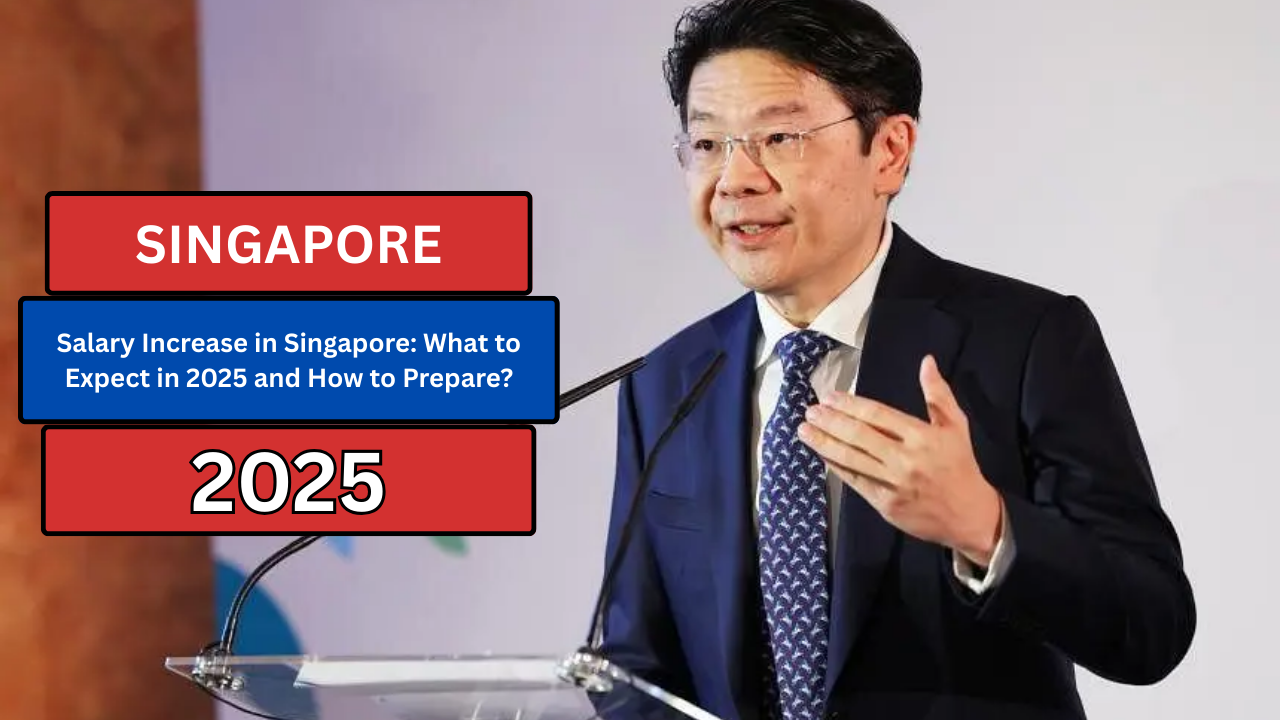As we step into 2025, professionals in Singapore are closely monitoring the salary landscape, especially as the country continues to recover economically.
With inflation gradually stabilizing and various industries evolving, salaries are expected to rise by 4.1% on average. This presents an excellent opportunity for employees to evaluate their worth and plan for potential salary negotiations.
Knowing how salaries are calculated, which sectors are likely to offer the highest increases, and how to negotiate effectively can significantly affect your financial outlook for the year ahead.
Pay Growth Across Key Sectors Signals Positive Shift
In response to the economic changes and inflation, several sectors in Singapore are seeing a marked rise in salaries. Industries such as real estate, banking, and technology are forecasted to experience salary growth of up to 4.5%.
This increase is driven by factors like a recovering economy, talent shortages in high-demand areas, and inflationary pressure.
With businesses becoming more competitive in attracting and retaining top talent, employers are revising their compensation strategies, and this is reflected in the rise of wages across various industries.
The real estate sector, for instance, is benefiting from a booming property market, which has led to a surge in demand for real estate professionals.
Similarly, the banking and financial services sectors are expected to see a robust rise in pay, especially as the demand for skilled professionals in fintech and digital banking continues to grow.
Moreover, the technology sector, which has seen significant growth in recent years, continues to require specialized talent, pushing wages upward.
Factors Driving the Upward Trend in Wages
The anticipated salary increments in 2025 are a result of several key economic factors. As Singapore continues to recover from global disruptions, businesses are boosting wages to stay competitive.
This economic recovery has seen increased demand for professionals in critical areas, particularly in digital transformation and financial services.
The government’s support for fair employment practices is also a contributing factor. Various programs designed to help businesses attract and retain local talent, as well as promote fair wages, have had a positive impact.
Furthermore, the increasing cost of living in Singapore has forced companies to review their salary packages to ensure that employees can maintain their purchasing power. With inflation on the rise, employees can expect to see salary increases that match or slightly exceed inflation rates.
Sector-Based Salary Trends for the Year Ahead

While the national average salary increase is predicted at 4.1%, the actual increase varies depending on the industry. For professionals working in technology and financial services, salaries are expected to rise by as much as 4.5%.
This is followed closely by the real estate sector, where wages are projected to grow by 4.3%. The healthcare and biotech sectors are also experiencing strong wage growth, with expected increases of around 4.2%.
On the other hand, sectors such as manufacturing and retail may see slightly lower growth rates. Manufacturing professionals can expect an increase of about 3.8%, while those working in retail and hospitality may see a more modest rise of around 3.5%.
These figures provide a helpful guideline for professionals in each sector to manage their expectations and plan for their future earnings accordingly.
Demystifying Salary Structures
Salary calculations in Singapore are influenced by various factors, and understanding these can help employees better navigate their career growth.
The base salary forms the core of your compensation, typically determined by your job title, role, and experience. However, other allowances like housing, transportation, and bonuses can add significant value to your overall pay package.
It’s important to factor in the impact of inflation on your real income. Even if you receive a salary increase, if it doesn’t keep up with inflation, your purchasing power could effectively decrease.
This is why understanding how salary increments are calculated is key to evaluating the actual benefit to your financial situation.
Know Your Net Income
Once you have a clear understanding of your gross salary, it’s crucial to calculate your net income — the amount you take home after deductions.
Dedications in Singapore typically include CPF contributions, income tax, and other social security payments. These deductions vary depending on your salary level, and knowing how much you take home each month is essential for budgeting and financial planning.
Online calculators are available to estimate your net income after deductions, and it’s highly recommended to use these tools to plan your monthly expenses, savings, and investments.
Having a good grasp of your take-home pay ensures you can make more informed financial decisions and avoid any surprises when your salary is deposited.
Strategic Tips for Salary Negotiation in 2025
Asking for a raise or negotiating a higher salary can be intimidating, but preparation is the key to success. One of the first steps in salary negotiation is conducting thorough research.
Websites like Glassdoor, Payscale, and government resources like the Ministry of Manpower can help you benchmark your salary against industry standards and the expected pay for your role in the current market.
When it’s time to negotiate, make sure to highlight your achievements, contributions, and skills that directly benefit the company. Successful projects, increasing productivity, and specialized skills can justify your request for a higher salary.
Furthermore, timing your negotiation request is crucial — performance reviews or after the successful completion of major projects are ideal times to initiate the conversation.
Expanding the Conversation
Sometimes, employers may not be able to offer the salary increase you are looking for. If this happens, it doesn’t necessarily mean the end of your negotiations.
Other aspects of your compensation package can be discussed, such as additional vacation days, flexible working hours, or opportunities for professional development. These benefits can offer long-term value, improving your career satisfaction and overall work-life balance.
Being open to discussing these non-monetary benefits can help maintain a positive relationship with your employer while still ensuring that your compensation package reflects your needs and aspirations.
Keeping the conversation professional and respectful ensures that, no matter the outcome, you continue to make progress in your career.
Embrace the Opportunity to Grow Your Worth
The projected salary growth for Singapore in 2025 provides a valuable opportunity for professionals to reassess their compensation and take steps to increase their earning potential.
Understanding salary trends, staying informed about your industry, and preparing for salary negotiations are crucial steps to ensure you get the most out of the economic recovery.
Whether you plan on switching jobs or seeking growth within your current role, now is the time to evaluate your value in the job market.
Armed with knowledge about salary structures and the sectors offering the highest growth, you can take proactive steps to negotiate a salary that reflects your skills, experience, and the current economic conditions.



